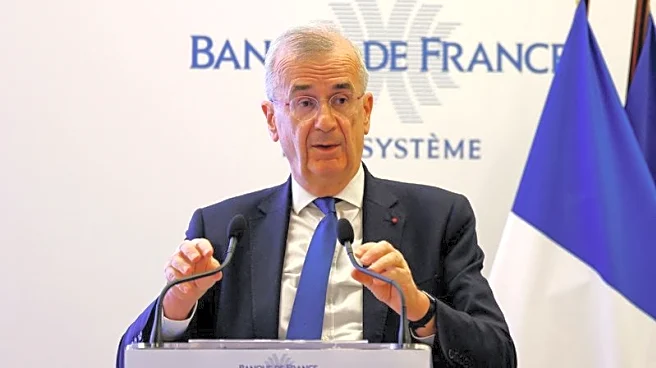Rapid Read • 9 min read
President Trump has signed an executive order that could significantly change the landscape of 401(k) retirement savings plans in the United States. The order aims to expand the range of investment options available to Americans by allowing 401(k) plans to include alternative assets such as cryptocurrency, private equity, and real estate. This move is intended to democratize retirement savings by providing more diverse investment opportunities. The discussion around these changes was highlighted in a conversation between Deborah Becker of Here & Now and Michael Regan, managing editor at Bloomberg News. The executive order represents a shift from the traditionally conservative investment options associated with 401(k) plans, which have typically focused on stocks, bonds, and mutual funds.
AD
The potential inclusion of alternative assets in 401(k) plans could have significant implications for both individual investors and the broader financial market. On one hand, it offers the possibility of higher returns and diversification, which could be beneficial for retirement savers looking to maximize their investment growth. On the other hand, these assets come with increased risks, such as volatility and lack of transparency, which could undermine the traditionally low-risk nature of 401(k) plans. Financial advisors express concern that these changes might expose retirement savings to greater uncertainty, potentially affecting the financial security of millions of Americans. Meanwhile, private equity firms and other alternative asset managers may see this as an opportunity to access a new pool of capital.
As the executive order takes effect, regulatory agencies will need to redefine what constitutes qualified assets under 401(k) rules. This process will involve careful consideration of the risks and benefits associated with alternative investments. Financial advisors and retirement plan administrators will likely need to update their strategies and guidance to accommodate these new options. Additionally, there may be increased scrutiny from lawmakers and consumer protection groups regarding the potential impact on retirement security. Stakeholders across the financial industry will be closely monitoring the implementation of these changes and their effects on the retirement savings landscape.
The introduction of alternative assets into 401(k) plans raises ethical and legal questions about the responsibility of plan administrators to protect investors from high-risk investments. There is also a cultural shift at play, as traditional views on retirement savings evolve to include more modern and potentially volatile investment vehicles. This development could lead to long-term changes in how Americans approach retirement planning, emphasizing the need for increased financial literacy and awareness of investment risks.
AD
More Stories You Might Enjoy














